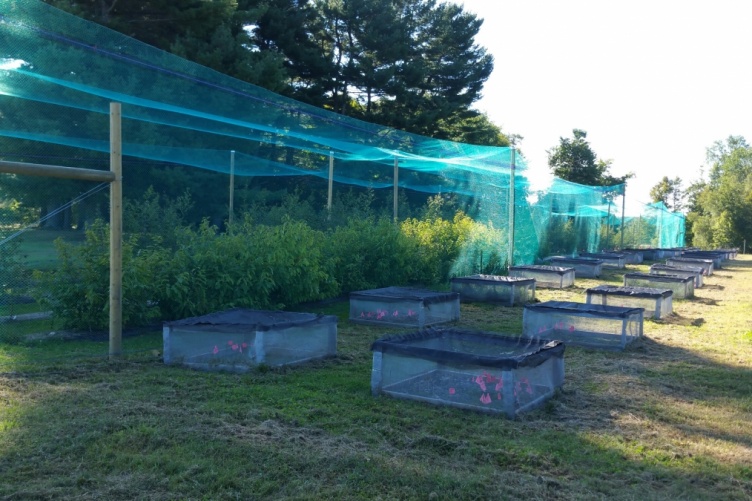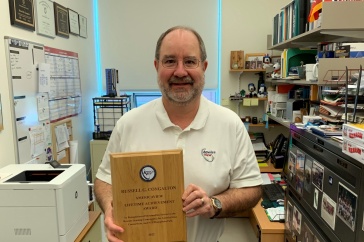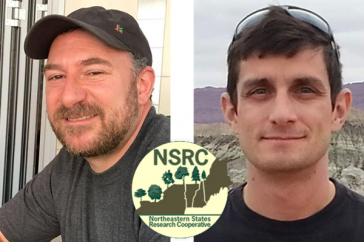
UNH has conducted extensive research on glossy buckthorn, including planting an orchard of the fast-growing shrub at UNH’s Kingman Farm to determine the life history characteristics of invasive glossy buckthorn under controlled conditions, free from competition with other plants, and free from variation in other environmental factors such as soil or micro-climate.
Researchers with the NH Agricultural Experiment Station at the University of New Hampshire have received a half a million dollar USDA grant to investigate the economics of managing invasive plants in forests owned by private landowners.
The research project will be directed by experiment station researcher Shadi Atallah, assistant professor of environmental and resources economics, in collaboration with experiment station researcher Tom Lee, associated professor of environmental conservation and sustainability. It builds on extensive research conducted by Lee about glossy buckthorn, a non-native shrub that outcompetes with native plants, including the economically important eastern white pine. According to the North East State Foresters Association, the annual value of sales of New Hampshire’s forest products industry totals nearly $1.4 billion.
The long-term goal of the $499,883 research project is to determine to what extent having many private forest landowners with different ownership objectives, as is the case in the Northeastern U.S., acts as a driver of bioinvasions at the landscape level. This can then inform forest invasive plant management strategies and public policy instruments that address the tension between individual landowner and landscape level objectives.
“Thirty- five percent of U.S. forests are owned by more than 10 million individuals and families with different goals and motivations and landownership fragmentation is expected to increase. These landowners' individual invasive management decisions over time and across a forested landscape can either facilitate or impede society's ability to manage invasions and secure the continued provision of forest ecosystem services that society’s welfare relies upon,” Atallah said.
“Effective management of invasive plants is critical for the long-term ecological health of forest ecosystems and the economic vitality of communities. Increasingly, the management of forest plant invasions is recognized as a challenge that requires multidisciplinary efforts that takes into account both the natural and socioeconomic aspects of the problem,” he said.
Specifically, researchers plan to map risk of glossy buckthorn invasion in New Hampshire, Maine and Massachusetts, estimate costs and benefits of available and new glossy buckthorn control strategies, conduct focus groups, surveys, and choice experiments among landowners within the invasion hot spot areas to estimate their willingness to adopt available management strategies, and develop spatial bioeconomic models to understand whether and how landowner characteristics affect negative spillovers in forest plant invasion management.
In addition to Atallah and Lee, the multidisciplinary team of researchers also includes UNH researchers Jenica Allen, assistant professor of quantitative ecology; experiment station researcher Mark Ducey, professor of forest biometrics; Ju-Chin Huang, professor of economics; Karen Bennett, extension professor of forest resources; and Jessica Leahy, associate professor of Human Dimensions of Natural Resources at the University of Maine.
The grant was made by the U.S. Department of Agriculture's (USDA) National Institute of Food and Agriculture (NIFA), with funding made possible through NIFA’s Agriculture and Food Research Initiative (AFRI) program, authorized by the 2014 Farm Bill.
AFRI is America’s flagship competitive grants program for foundational and translational research, education, and extension projects in the food and agricultural sciences. This is the first round of grants made under the Pests and Beneficial Species in Agricultural Production Systems area of the AFRI Foundational program. Funded projects support research to promote beneficial organisms associated with pests, as well as to better understand the fundamental mechanisms that inform interactions between plants, pests, or beneficial species. The research is expected to lead to innovative, environmentally sound strategies to manage agricultural pests and beneficial species.
This material is based upon work supported by the NH Agricultural Experiment Station, through joint funding of the National Institute of Food and Agriculture, U.S. Department of Agriculture, and the state of New Hampshire. This work also is supported by NIFA’s Agriculture and Food Research Initiative through accession 1012155 and by NIFA McIntire-Stennis accessions 1006668 and 1007007.
Founded in 1887, the NH Agricultural Experiment Station at the UNH College of Life Sciences and Agriculture is UNH’s original research center and an elemental component of New Hampshire's land-grant university heritage and mission. We steward federal and state funding, including support from the USDA National Institute of Food and Agriculture, to provide unbiased and objective research concerning diverse aspects of sustainable agriculture and foods, aquaculture, forest management, and related wildlife, natural resources and rural community topics. We maintain the Woodman and Kingman agronomy and horticultural research farms, the Macfarlane Research Greenhouses, the Fairchild Dairy Teaching and Research Center, and the Organic Dairy Research Farm. Additional properties also provide forage, forests and woodlands in direct support to research, teaching, and outreach.
-
Written By:
Lori Tyler Gula, PhD | NH Agricultural Experiment Station | lori.gula@unh.edu | 603-862-1452



















































